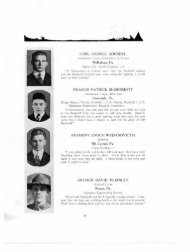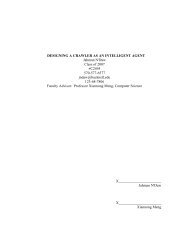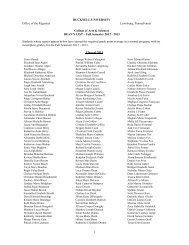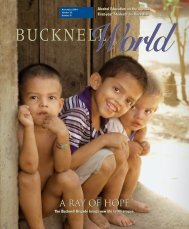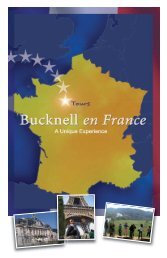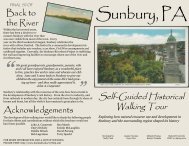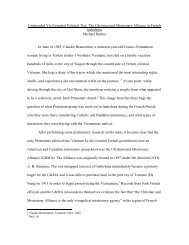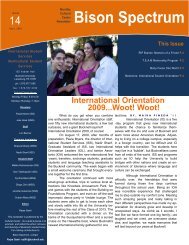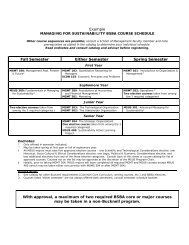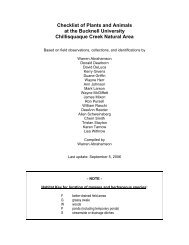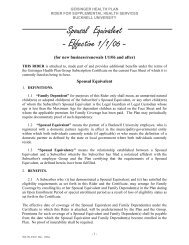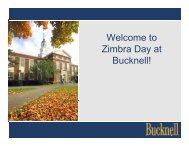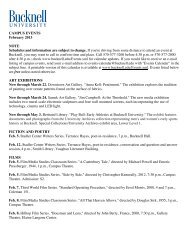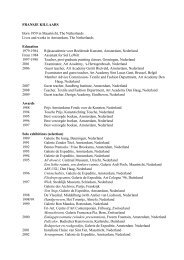World - Bucknell University
World - Bucknell University
World - Bucknell University
You also want an ePaper? Increase the reach of your titles
YUMPU automatically turns print PDFs into web optimized ePapers that Google loves.
Readers Write<br />
Letters<br />
Editor’s Note: We encourage letters to the editor related to topics discussed in the<br />
most recent issue of <strong>Bucknell</strong> <strong>World</strong>, matters that relate to university news or policies,<br />
or that are of interest to a segment of our readership. Letters should be no<br />
longer than 300 words and may be edited for length, clarity, and civility. Letters<br />
can be mailed, faxed, or sent via email to bworld@bucknell.edu. Letters received<br />
between now and Sept. 15 will be considered for the November issue. Additional<br />
letters will be posted on the <strong>Bucknell</strong> <strong>World</strong> website. The complete letters policy can<br />
be read at www.bucknell.edu/<strong>Bucknell</strong><strong>World</strong>.<br />
MORE TO SAY<br />
At Reunion Rally, I was one of<br />
six members from the Class of<br />
1956 to receive the Alumni<br />
Association’s “Loyalty to <strong>Bucknell</strong>”<br />
award. Each of us was deeply moved<br />
by the honor, but it was correctly suggested<br />
that we keep our acceptance<br />
speeches short. Anyone who knows<br />
me must have been stunned that I<br />
actually did what I was told and spoke<br />
for about 90 seconds, with a couple of<br />
anecdotes and a heartfelt thank you.<br />
I have more to say.<br />
In my haste to break my all-time<br />
record for keeping quiet, I accidentally<br />
left out what I really wanted to say to<br />
that great gathering of classes at the<br />
Weis Center. First, there is no greater<br />
place on earth than the <strong>Bucknell</strong> I<br />
attended in the 1950s … unless it<br />
would be the <strong>Bucknell</strong> of today.<br />
Through all these years, I have<br />
remained close to the <strong>University</strong><br />
because I strongly believe that higher<br />
education is one of the most critical<br />
elements of a free society. I also cannot<br />
imagine what my life would be like<br />
without <strong>Bucknell</strong>.<br />
<strong>Bucknell</strong> has always been special<br />
to my classmates and me. What we<br />
have seen over the 50 years since graduation<br />
is a phenomenal metamorphosis<br />
from a small, rural institution to one<br />
of the finest and most respected universities<br />
in the nation. I believe this is a<br />
decisive period in the history of our<br />
<strong>University</strong> and that the next 5–10 years<br />
will be incredibly dynamic. The Plan for<br />
<strong>Bucknell</strong> accurately addresses our<br />
strengths and aspirations. We have<br />
everything in place to move our<br />
<strong>University</strong> to the pinnacle of greatness.<br />
Furthermore, we have a powerful and<br />
passionate administration — led by<br />
President Mitchell and Provost<br />
DeCredico — determined to take us to<br />
that next level.<br />
From what I saw at Reunion, the<br />
alumni are ready, willing, and anxious<br />
to join this great venture. Speaking for<br />
the Class of 1956, I believe each of us<br />
cherishes the feeling we get every time<br />
we return to campus and the pride we<br />
share in being <strong>Bucknell</strong>ians. It has<br />
been an amazing journey. And I’ll<br />
guarantee that when the members of<br />
the Class of 2006 return for their 50th<br />
Reunion, they also will look back in<br />
amazement.<br />
Art Kinney ’56<br />
Lake Barrington Shore, Ill.<br />
4 BUCKNELL WORLD • September 2006<br />
THE GREEK<br />
CONNECTION<br />
The Alumni Association News<br />
section in the June 2006<br />
issue, titled “<strong>Bucknell</strong> Friends<br />
Forever,” was very interesting. You<br />
made note of how fraternity and sorority<br />
alumni have kept in close contact with<br />
their brothers and sisters through the<br />
years after their graduation. I know<br />
from my own experience that I get<br />
together with my own fraternity brothers<br />
much more frequently than I do with<br />
fellow classmates with whom I resided<br />
as a freshman or sophomore. I have<br />
much more in common with my<br />
fraternity brothers. I was a chemistry/<br />
economics major and have not seen<br />
any classmates since graduation except<br />
my fraternity brothers or members of<br />
other fraternities I associated with<br />
socially. I even spend time with fellow<br />
brothers who did not attend <strong>Bucknell</strong><br />
until after I had graduated.<br />
Additionally, in the same issue,<br />
Bob McKernan’s ’48 letter titled “Greek<br />
for Life” expresses the same thoughts.<br />
Greek life just made college more<br />
enjoyable by teaching us how to grow<br />
and not just hit the books and study, as<br />
we did when getting our MBA degrees,<br />
when our only association with other<br />
students was in class or the library.<br />
James Hurtt ’52<br />
Stuart, Fla.<br />
MAKE A SPACE<br />
FOR ART<br />
This letter is a follow-up to<br />
Richard Zandler’s ’73 letter,<br />
“Campaigning for the Arts,” in<br />
the April issue.<br />
<strong>Bucknell</strong> has a proud tradition as<br />
a leading liberal arts university,<br />
providing an environment that fosters<br />
development of each individual’s<br />
critical intellect, as well as social and<br />
historical awareness. We, the undersigned<br />
alumni, each a former graduate<br />
assistant in sculpture, have used our<br />
<strong>Bucknell</strong> experience to pursue careers<br />
in the visual arts. As devoted advocates<br />
of the importance of arts learning, we<br />
know that the physical environment<br />
for visual arts at <strong>Bucknell</strong> is scattered<br />
across campus, has not improved much<br />
over the years, and is so inadequate<br />
that a new facility is certainly needed.<br />
A comparison to <strong>Bucknell</strong>’s<br />
“frame of reference” schools reveals<br />
the following:<br />
• Lafayette College boasts the<br />
23,500 square-foot Williams Visual<br />
Arts Building, which opened in 2001,<br />
and “is one of the leading high-tech<br />
facilities for art education and exhibitions<br />
in the nation.”<br />
• Colgate has the architecturally<br />
distinguished new Schupf Studio<br />
Building, providing studio spaces for<br />
advanced students and faculty and two<br />
teaching galleries.<br />
• Skidmore features the Tang<br />
Teaching Museum and Art Gallery,<br />
“nationally known for both its architecture<br />
and its holdings.”<br />
The complexities and variety of<br />
teaching in the creative arts requires<br />
space beyond that of typical classrooms.<br />
A new dedicated facility at a<br />
single site would vastly improve the<br />
learning context of the visual arts,<br />
enabling art faculty and students<br />
to achieve a broader and deeper<br />
coherence and resonance in their<br />
creative experiences while furthering<br />
<strong>Bucknell</strong>’s fine reputation as a leader in<br />
liberal arts education.<br />
Bruce Lindsay ’83<br />
Yardley, Pa.<br />
Other signees include Allen C. Topolski ’86,<br />
David Marshall ’75, Peter Bevis ’75,<br />
Richard Zandler ’73, Georgia Gerber ’77,<br />
William H. Bennett ’70, and Eric Troffkin.<br />
SPEAKING OF<br />
MUSIC ...<br />
Ivery much enjoyed “The Singing<br />
College” [April 2006], but I think<br />
the writer short-changed Paul<br />
Stoltz a bit. He was not the head of the<br />
music department from 1908–13 but<br />
from 1908–48. It was he who brought<br />
Melvin Le Mon and William McRae<br />
to <strong>Bucknell</strong> along with other distinguished<br />
faculty members. He was<br />
instrumental in my changing to a<br />
music major in 1947.<br />
As I recall, somewhere back in the<br />
teens, the name was changed from the<br />
School of Music to the Department of<br />
Music. This could possibly account for<br />
the wrong dates in your story. When I<br />
graduated in 1949, the old house on<br />
Third Street was still labeled School of<br />
Music.<br />
In the fall of 1942, I was a freshman<br />
engineering student, but I played<br />
trumpet in the marching band. I heard<br />
older members of the band talk about<br />
Melvin Le Mon, and I got the impression<br />
that he left in the spring of 1942. I<br />
don’t remember ever seeing him, and<br />
Charles Stickney was the band director<br />
when I was a member.<br />
Speaking of Le Mon’s music, a<br />
few years before I retired from<br />
Chicago Musical College of Roosevelt<br />
<strong>University</strong> in 1986, while browsing<br />
through a secondhand music store, I<br />
found a spiral-bound manuscript copy<br />
of Le Mon’s folk opera, Down, Down,<br />
Down. He used the folk and work music<br />
of Pennsylvania anthracite miners as a<br />
basis for his opera. A handwritten preface<br />
states that all the research for it was<br />
done between 1933–39, which covered<br />
most of his time at <strong>Bucknell</strong>. The piece<br />
itself apparently was not completed<br />
until 1957. I have no idea if it was ever<br />
performed, but I still have the score.<br />
Cliff Reims ’49<br />
Fairhope, Alaska<br />
Editor’s Note: Bill Le Mon ’54, Melvin Le<br />
Mon’s son, responds. “Mr. Reims got most of<br />
his facts right. My father collected the songs<br />
of the coal miners while he was working on<br />
his Ph.D. at Eastland. His intention at the<br />
time was to get a record of the folk music,<br />
not write an opera, which he did not do<br />
until 1960. My father left <strong>Bucknell</strong> in 1943,<br />
and his opera was performed at Alfred<br />
<strong>University</strong> in 1964.”<br />
“Dear President Mitchell, I had planned to send you thought-provoking and<br />
probing feedback regarding The Plan for <strong>Bucknell</strong>. Unfortunately I am forced to<br />
send a check instead. I’ll try to do better next time.”



